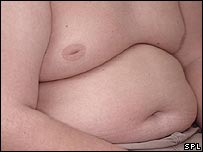|
By Clare Murphy
Health reporter, BBC News
|

A new report tell us to lose more weight, stop eating bacon butties and keep our drinking habits well in check if we want to reduce our risk of cancer.

But even if you are slimmer you should still worry, the report says
|
Even fruit juice does not escape the wrath of the report, whose author says cancer is not a "fate" but a disease which is often in our power to prevent.
The 10 recommendations issued by the World Cancer Research Fund are supposed to help us take our destiny in our hands.
These are stark warnings, and suggest that even those who have strived to bring their weight into the "healthy margin", cut their alcohol consumption to government guidelines and reduced their red meat intake may still not be doing enough.
There is no room for complacency, the report suggests: everybody needs to do more.
But in an age in which people are inundated by health promotion messages urging standards they feel they cannot possibly meet, there is debate as to whether these latest instructions will have the desired effect.
And for some, the denial of basic pleasures - be it pepperoni pizza or half a bottle of wine - would render intolerable the life such restrictions are meant to protect.
Aim high
The construction of health messages has been the subject of extensive research.
Putting forward high - perhaps even unattainable - standards are one option, with the hope that people are scared into action and at least start to make a move towards that far-off goal.
 |
 As a doctor I urge moderation, but I would hate us to end up in a position where we have to go through a period of soul searching over everything we do and eat
As a doctor I urge moderation, but I would hate us to end up in a position where we have to go through a period of soul searching over everything we do and eat

|
The other - perhaps unfairly dubbed the "dumbing down" approach - is to encourage behaviour that everyone is capable of.
The government was for instance recently accused of leading the nation to believe that potting a few flowers amounted to physical exertion, after it listed gardening as one way of meeting the recommended 30 minutes of brisk activity each day.
"Increasingly we are learning that applying a one-size-fits-all policy in the hope that some people might be moved to do something doesn't work," said Mark McDermott, an expert in health psychology at the University of east London.
"These cancer recommendations are not really for the average person sitting at home. Public health specialists need to sit down and work out what's valuable here, and what you can put into a message that will get through to the right people."
Heard this before
Frequent campaigns also run the risk of squandering people's attention.
In recent years there has been growing concern about "health message fatigue", as Western governments have stepped up their involvement in the promotion of health.
Some people are simply switching off.
"And that's a worry," says Fred Kavalier, a genetics consultant at Guys and St Thomas Hospital, "because we do need to understand that there is a clear link between lifestyle and cancer, and you can do something to protect yourself."
There must nevertheless be limits to what people are asked to do, he argues.
"Ultimately one in three of us will get cancer, and we can't spend our whole lives worrying about it.
"As a doctor I urge moderation, but I would hate us to end up in a position where we have to go through a period of soul searching over everything we do and eat - that's not what life should be about."



Bookmark with:
What are these?